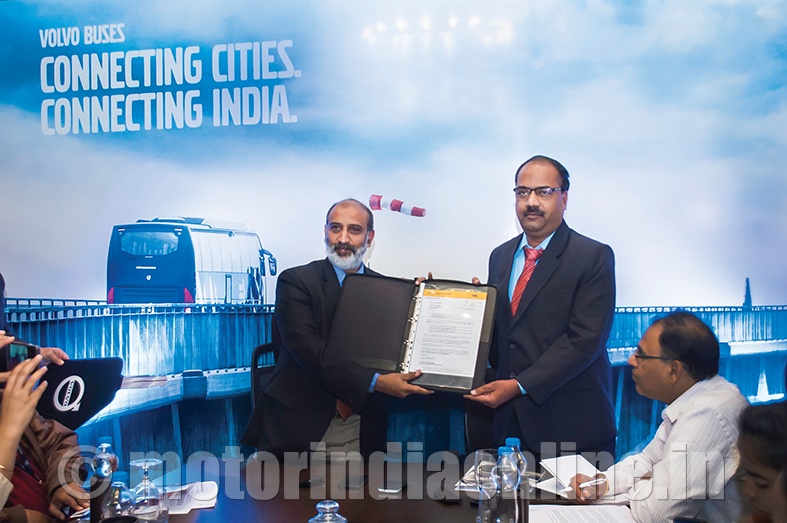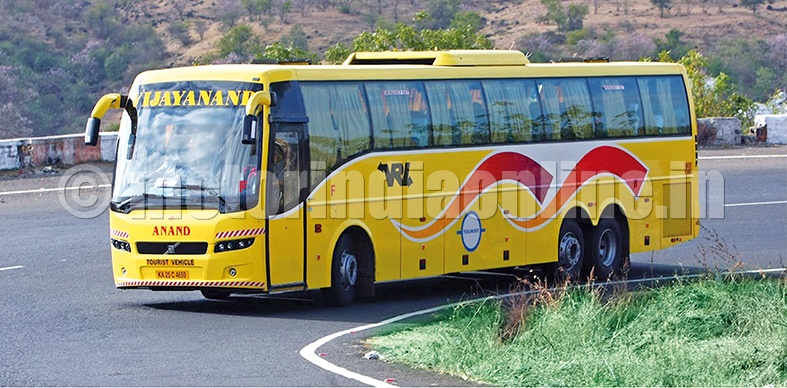Today tourists in India have better options. If train tickets are not available or air travel becomes a little costly, well-networked bus services offer an affordable and easy choice. Several transporters are now offering first-class transit options to travel inter-city, irrespective of the distances involved and the number of hours. With the revival of the industry, more transport service providers are cautiously but positively moving ahead in acquiring new luxury coaches. Factors like the need to replace older bus bodies, increase the frequency on the existing routes and raise revenue to open new routes are encouraging some transport companies to seek new passenger vehicles.

Triggering growth
Recently, in January, two giants of the transport industry came together after nearly five years. Volvo Buses and VRL Logistics announced the official status of the purchase of 51 multi-axle inter-city luxury coaches. Presiding over the joint press conference, both Mr. V R V Sri Prasad, Business Head, Volvo Buses India & South Asia, and Mr. Prabhu Salageri, Vice President (Travels), VRL Logistics, referred to the current uptrend in the Indian transport industry. The purchase of buses worth Rs. 60 crores by VRL is in preparation of the holiday season commencing from March-April 2016.
On the occasion, Mr. Prasad shares: “This move symbolically marks the coming back of the market. We have seen that last when VRL bought vehicles we were the only players in the coach market. In the last couple of years we have seen competition coming in but when there is a choice available to a big operator like VRL, we are overwhelmed by their decision to put their trust and confidence in us. This signifies that we are on the right track. For us, it is definitely a big occasion.”
VRL has the largest fleet of commercial vehicles with more than 4,000 vehicles, of which 373 are buses. Of these buses, the number of Volvo buses till recently, stood at 140. Now with the placement of the new order, the number totals 191. VRL boasts of its dedicated presence in southern and western parts of India.
VRL has placed an order for a mix of Volvo 9400 XL and 9400 PX coaches equipped with I-Shift. Each bus costs VRL approximately Rs. 1.2 crore. Of these buses, 11 are 51-seater B11R premium models and the remaining will be the 47-seater B9R models, shares Mr. Salageri.
Echoing the celebratory sentiment, Mr. Salageri says: “It is the requirement of the time. In the last three or four years, there was a slowdown in the market. But now it is picking up. Even during the slow phase, our growth rate was 25 per cent a year. To stabilize and to replace the vehicles, because all our fleet is three to four years old, we need good vehicles for long distance journeys. That is one reason. And the second is that we wish to increase the frequency on our existing routes for which we want to add vehicles.”
An interesting alternative
The most popular and the longest distance that VRL plies on is Bengaluru-Jodhpur route which is 2031 km long that is covered in 36 hours. Mr. Salageri says: “Our buses that run on long-distance routes will be replaced with new ones because in a span of three years the buses going to Gujarat and Rajasthan clock 10 lakh km. So, roughly 50 per cent of these 51 vehicles will be for replacements. Our replacements will not go off the road but they will be placed in short routes. We cover at least 2,000 km in long-distance routes for which we need good vehicles.”
VRL is planning to expand to new routes in inter-city bus services from Bengaluru to Nagpur, Nasik, Indore, Pune and Visakhapatnam, besides from Goa to Ahmedabad and Mumbai, and between Pune-Nagpur and Chennai-Visakhapatnam. He shares the details: “We want three vehicles on the Bengaluru-Ahmedabad route because we cannot cover the time with just two vehicles, so we are keeping one vehicle in rotation. In total, the three vehicles will cover a distance of 1,600 km in rotation.”
Previously, Volvo provided 100 luxury coaches to VRL in 2010, and the task was completed over a period of 1½ years. The current deal is hoped to conclude in the next six months.
Says Mr. Prasad: “Though it is a task garnering a deal with VRL, they do not work on customers for specific deals. The way Volvo functions is never from deal-to-deal. It is about an enduring symbiotic relationship where all concerned extend trust and respect to each other and also benefit from each other.”
Volvo Buses and VRL Logistics have associated with each other for the last 15 years.
Mr. Prasad talks about the upbeat sentiment of the market: “When we close 2015, we have fully air-conditioned, low-floor Volvo city buses, plying 34 cities across India. Importantly, we have been instrumental in influencing people because of the good quality of transit to leave their personal vehicles and to opt for public transportation. We are future-ready for our country – be it in terms of capacity where we have full-fledged bus building unit or making the buses in India and exporting to Europe.”
Safety standards
For both the transport giants, safety is an integral theme. Volvo formally acknowledged that it fully supports the Bus Body Code. Mr. Prasad adds: “2015 was an important year for us and for the industry. The Government started notifying and enforcing norms, including the Bus Body Code. Emergency doors were made compulsory. Right from the time our products are conceptualized, these things are integral to our buses.”
The Bus Body Code, issued by the Ministry of Road Transport and Highways, which has been in force since April 2015, enlists guidelines to manufacturers of bus body builders. This ensures a standard that must be strictly adhered to in terms of bus design, passenger leg space and material used to build the bus besides making it mandatory to include active and passive safety features like the incorporation of ABS and providing hammers for each window, among others.
Speaking on the same, Mr. Salageri shares: “We are the only company to provide double drivers on board irrespective of the distance to be covered. Further, we also believe in adhering to the safety standards.”
Mr. Prasad adds: “Dr. Vijay Sankeshwar of VRL insisted that we train 150 drivers of theirs even before the volume of the purchase was released to us. At Volvo, it is the ‘Coach Captains’ we train. They are not mere drivers. We believe that it is all about attitude. In our five-day training sessions for these coach captains, we insist on training them in such a way that they become successful certified drivers. They are made aware of self-esteem, sense of responsibility and safety procedures.”
With the surge in the passenger transport industry growth, bus journey has become safer and more economical, besides reducing pressure on air and rail traffic.
So, now, luxury bus travel has been made easy and affordable.
